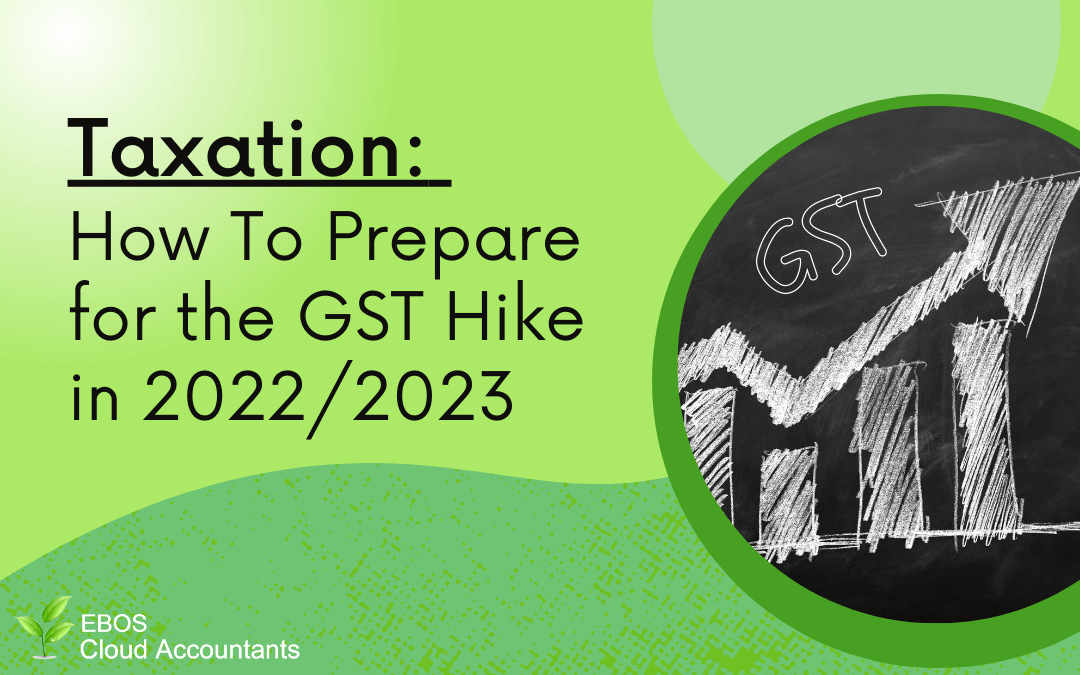Whether while making individual purchases or while including GST charges on your company’s invoice, we’ve all been working with a 7% GST charge for some time now. When the hike to 9% was announced, rescheduled temporarily to begin hiking in 2023 instead, many were not sure what this would mean, and how it would affect their personal and company finances.
In this article, we will discuss the impact of the tax hike on businesses, and how companies can address and prepare for this event to be coming in less than a year.
GST in Singapore
GST, or the Goods and Services Tax, is a standard part of life in Singapore. Businesses add the 7% GST charge to goods and services provided, and this cost is then usually transferred over to the customer. This is why there is usually an added GST charge at the bottom of your receipt, although it is often already factored into the prices that are given. In short, consumers or clients pay the GST to businesses, who then pay it to the government.
While companies and new companies that earn less than 1 million SGD are exempt from needing to pay this tax, businesses that earn over 1 million SGD in revenue are mandated to undergo GST registration or GST filing Singapore when their records (usually mandated financial records that every company has to file unless they are dormant) are updated. This GST registration is not automatic, and should be done on the IRAS portal.
While there are specifics that vary from company to company and industry to industry, these are the basics that every company owner should know.
The GST Hike to 9%
The most recent reports note that GST would increase to 8% beginning 1 January 2023, and then 9% on 1 January 2024. Like other taxes in Singapore, the hike isn’t just for the fun of it, but is intended to offset healthcare as well as the care of aging populations in Singapore. It has been noted that well that any increase in government fees and charges will be delayed to 1 Jan 2024, including fees to apply for driving licenses and anything charged by government agenies, such as school fees and ERP.
Additional efforts to offset specific sectors or industries have also been announced – for instance, Assurance Packages help offset the costs of GST hikes for Singaporean households. Strictly speaking, while businesses do not necessarily need to do anything since the costs are ultimately borne by clients, the truth is that this hike is still reflected on the cost of goods and services: on price tags, quotes, and invoices. As such, a strategy should be implemented to ensure that business interruptions or issues regarding the cost of your products can be addressed.
Addressing Your Customers and Clients
Even with the knowledge of the GST price hike, initial reactions to seeing increased costs may be met with discontent. As such, every company’s sales and marketing teams should be well-equipped with the knowledge of this hike, and be able to use it to justify the increase in prices to clients.
As mentioned before, a strategy also needs to be put in place to ensure that sales and conversion are able to continue on the desired trend. If the price increase has the potential to reduce purchases, then something else must help to bring sales rates back up to where you want it to be.
While defensive methods may work (e.g., noting that the price hike is standard across all businesses), there is no guarantee that it will help with conversion. Additional persuasion or even other methods (adding bonuses, discounts, features) may be needed here. Formulate a plan with your sales and marketing team to ensure that no disruptions result.
Note as well that most clients may receive a cash reimbursement to offset this hike, and thus should help with the issues regarding the total price hike in expenditure.
GST Filing Singapore and Regulatory Steps
If you were already previously filing GST, there is almost no change here other than the actual increase in amount. Continue to work with either your manual filing, your accounting or secretary firm, or your accounting software in order to ensure that your regulatory compliance is up to date.
In summary
The GST price hike is aimed at supporting and strengthening Singaporean healthcare infrastructure, as well as to care for an aging population. While the price hike is ultimately passed down to end consumers, customers, or clients, it is imperative that businesses are able to address any issues with revenue that may arise from it. It is especially important to design any counterplans and factor this price hike in if your company earns over 1 million SGD (i.e., if you are mandated for GST registration).
For any further queries regarding the GST price hike, please feel free to contact us!







